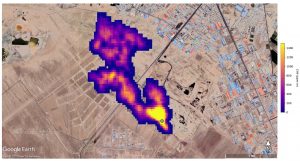Up to 40 SpaceX high-speed internet satellites have been knocked out of orbit by a geomagnetic storm shortly after launch, but pose little threat to Earth as they burn up in the atmosphere, the company said.
Geomagnetic storms are caused by ejections of the solar corona into space, resulting in disturbances to the Earth’s upper atmosphere and increased drag on objects in low orbits.
The latest 49 satellites from the Starlink network launched from the Kennedy Space Center in Florida on February 3 and successfully assumed their initial orbit, with their nearest approach to the surface 210 kilometres high.
The company places them into this region to carry out final checks before flying further into space. On February 4, however, they were struck by the storm, Elon Musk’s company said in a statement late on Tuesday.
“These storms cause the atmosphere to warm and atmospheric density at our low deployment altitudes to increase,” SpaceX said.
“In fact, onboard GPS suggests the escalation speed and severity of the storm caused atmospheric drag to increase up to 50% higher than during previous launches.”
Like a Sheet of Paper
The Starlink team commanded the satellites into a safe mode, where they would fly edge-on – like a sheet of paper – to minimise drag as they sought shelter.
But despite the evasive manoeuvre, most were unable to raise their orbits, and as many as 40 “will re-enter or already have re-entered the Earth’s atmosphere.”
The company insisted they posed “zero collision risk” with other satellites and are designed to disintegrate upon re-entry, with no debris expected to hit the ground.
The loss could point to a design weakness in Starlink satellites’ ability to withstand such storms, David Todd of Seradata, a satellite database and space market analysis system, wrote in a blog post.
The incident is not expected to affect the overall functioning of the Starlink “constellation.”
SpaceX has launched more than 2,000 of the satellites since May 2019, with more than 1,500 currently operational, providing internet coverage across most of the planet.
- AFP, with additional editing by George Russell
READ MORE:
Elon Musk Rejects Satellite Criticism as SpaceX Raises $337m
Elon Musk Warns of SpaceX Bankruptcy Risk: Daily Telegraph
Musk’s SpaceX Forms Indian Subsidiary, Set To Start Business
























